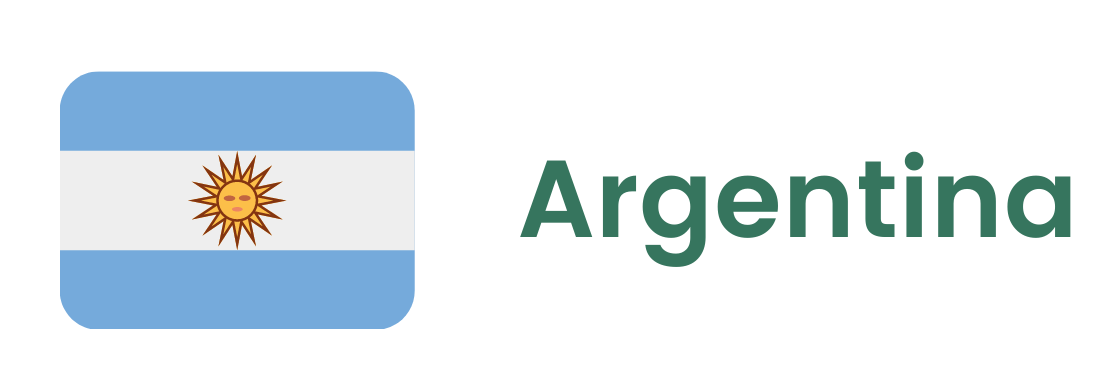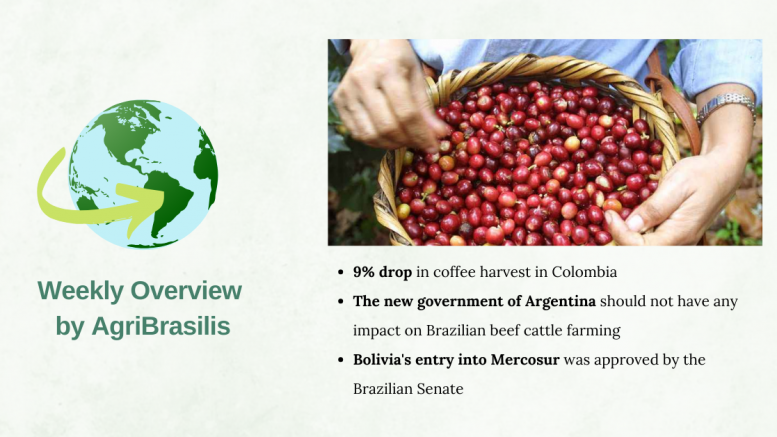Nestlé will invest US$ 1.22 billion in Brazil by 2025

Argentina has planted 3 million hectares of soybeans in just one week. Sowing has already reached 34.8% of the area reserved for soybeans in the country. Only the Northwest and Northeast of Argentina have not yet started planting. (Bolsa de Cereales)
National Health and Food Quality Service declared a health emergency across the country due to equine encephalomyelitis. The disease, caused by a virus that damages the horse’s nervous system, and is transmitted by a mosquito vector, has already been confirmed in several provinces of the country, such as Santa Fé, Corrientes, Buenos Aires, and Córdoba. (Senasa)
67% of corn farms were classified as regular, while 29% are considered excellent or good. These represent an increase of 4% and 17%, respectively, compared to the same period in the previous harvest. Prospects for corn in 2023/34 are promising. Estimated increase of 61.76% compared to the previous harvest. (Bolsa de Cereales)

Bolivia’s entry into Mercosur was approved by the Brazilian Senate. Luis Arce, president of Bolivia, said this is a “historical milestone in Latin American integration”. Bolivia’s entry into Mercosur was requested in 2015, but depended on the approval of the parliaments of the member countries. The Brazilian Federal Senate was the last to ratify accession, in a vote held on November 28th. The decision now needs to be confirmed by the Brazilian president, Luiz Inácio Lula da Silva. (Agência Senado; Government of Bolivia)

The Secretary of Commerce and International Relations of the Ministry of Agriculture, Roberto Perosa, said that the trade agreement with the European Union should be signed by Mercosur member countries next week. Representatives from Brazil, Argentina, Uruguay and Paraguay will meet in Rio de Janeiro to discuss the matter. (MAPA)
El Niño will continue to affect Brazil in the coming months, with intense rains in the South and drought in the North. Between November 15th and December 14th, 2023, parts of the South and Southeast will experience rainier conditions than normal. The rest of the country will have drier conditions, especially in the Amazon Rainforest, mainly in the center and south. In regions such as the States of Mato Grosso, Mato Grosso do Sul, north of Minas Gerais and southwest of São Paulo, irregular rainfall will keep water levels lower. (Inmet)
Nestlé will invest US$ 1.22 billion in Brazil by 2025. The focus of the investment will be on growth, technology and the new Purina facility, the company’s pet food brand. Brazil is the company’s third largest global market. (Nestlé)
Cattle confinement remains stable at 7 million heads in 2023. Confinement has grown as ranchers look for more efficient ways to finish cattle. (DSM)
The Mines and Energy Committee of the Brazilian Lower House of Congress (Chamber of Deputies) has approved Bill No. 1425/2022, which establishes the regulatory framework for carbon capture and storage. “There are legal issues related to the storage stage that were not defined in Brazilian legislation. The project brings some of these definitions…”, according to Isabela Morbach, lawyer and co-founder of CCS Brasil. the bill will go directly to the Lower House of Congress’ Environment and Sustainable Development Commission. (CCS Brasil; Agência Câmara de Notícias)
André Vinicius Iezak Rupel is the new business director for Lavoro’s “southern cluster”. (Lavoro Agro)
Considering the average sales price from January to October, Brazilian pig farmers received, on average, US$ 1.27 per kg of live pigs, an increase of 11% compared to the same period in 2022. (Cepea)
The new government of Argentina should not have any impact on Brazilian beef cattle farming. Production costs in the neighboring country are much higher than those in Brazil, making it difficult to compete, even if the Argentine government implements broad trade liberalization policies. (Cepea)
Solinftec issued a new CRA (Agribusiness Receivables Certificates), now worth US$ 30.43 million. The company’s fourth CRA was coordinated by Itaú BBA and structured by Opea Securitizadora. “We are in a breakeven year, with positive EBITDA and, through this issuance, we were able to extend our debt and strengthen the company’s cash position”, says Laís Braido, the company’s CFO. (Solinftec)
El Niño causes losses of US$ 510 million to agriculture in the State of Paraná. Wheat farmers, who were harvesting the 2022/23 crop, faced the biggest losses. Production fell by practically 980 thousand tonnes in relation to estimated potential, making it that at least 420 thousand tonnes of wheat will be destined for feed. Losses from this crop approach US$ 200 million. In other winter crops, especially barley, there was also a reduction: losses could reach US$ 40.64 million. For the 2023/24 season, the biggest losses were observed in the case of tobacco farmers, with an estimated loss of almost US$ 113.8 million, and a production decrease of 31 thousand tonnes. (Deral)


After signing a protocol that authorizes the entry of peaches and apricots into China’s market in October, Chile received inspectors from China’s customs to comply with the agreement’s phytosanitary protocols last week. This is the first visit that the Chinese customs has made to a foreign country after the pandemic. “With this opening, Chile became one of the few countries in the world to have all its fresh fruit approved to enter the Chinese market“, said Miguel Canala, general manager of Frutas de Chile. (Frutas de Chile)

Germán Bahamón, general manager of the National Federation of Coffee Farmers, said the local coffee harvest in 2023 reached only 10.6 million 60 kg bags of unroasted coffee, a decrease of 9.1% when compared to 2022, due to unfavorable weather conditions. There was also a 4% drop in consumption, as a result of inflation. (Fedecafé)

Court order has prevented imports of Brazilian pork. Mexican farmers filed an injunction contesting the process of opening the market for the pork imports, a deal that was formalized in 2023. Cargoes of Brazilian meat with an approximate value of US$ 60 million are inside ships that are still at sea, prevented from docking at ports. Senasica, the agency responsible for the health and quality of agri-food products, has already filed an appeal against the injunction. (Senasica; Ministry of Agriculture)


On November 28th, Panama’s Supreme Court declared unconstitutional the concession contract for the largest copper mine in Central America, whose approval in Congress provoked protests that paralyzed the country in recent weeks. María Eugenia López, president of the Supreme Court, announced: “We unanimously decided to declare unconstitutional the integrity of Law No. 406”, which refers to the contract between the Panamá State and the Canadian mining company First Quantum Minerals. (Supreme Court of Panama)

Considerable levels of rainfall were estimated in the East and West regions, which should improve water availability for crops. Between November 27th and December 4th, rainfall above 50 mm should occur. (Inbio)
![]()
Statement from the General Directorate of Livestock Services puts the country on alert for cases of equine encephalopathy, due to “confirmed cases of horses with equine encephalitis in Argentina and suspected cases reported in our country“. (Ministry of Agriculture)
President of Uruguay, Lacalle Pou, said that it is “imminent” that authorization will be approved so that Uruguayans can enter the USA without a visa. The president said that the liberalization project between countries could be broader, also involving a reduction in tariffs. “It’s like a mini free trade agreement”, said Pou. (Government of Uruguay)

READ MORE:

